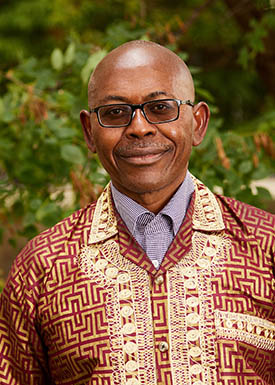Charles Rotimi, Ph.D., Is NHGRI’s New Scientific Director
Genetic Epidemiologist and Genomics Researcher To Lead NHGRI’s Intramural Research Program

CREDIT: ERNESTO DEL AGUILA III, NHGRI
New NHGRI Scientific Director Charles Rotimi.
On October 10, 2021, Charles Rotimi became the new scientific director of the National Human Genome Research Institute (NHGRI), succeeding Dan Kastner, who had served as scientific director since October 10, 2010. Rotimi is a leading genetic epidemiologist and genomics researcher with expertise in statistical genetics, computational science, biochemistry, health disparities, and scientific management. He will be the first African-born scientist to hold the position of scientific director at the NIH.
Rotimi, an NIH Distinguished Investigator and chief of the NHGRI Metabolic, Cardiovascular, and Inflammatory Disease Genomics Branch, joined NIH in 2008 as the founding director of the trans-NIH Center for Research on Genomics and Global Health. He has designed and led major basic science and clinical research projects in human genomics. Rotimi is also a leader in the development of global genomics expertise and resources, acting as a vocal advocate for increased ancestral diversity in research participants and in the international scientific workforce.
“His work has led to multiple transformative success stories in human genomics,” said NHGRI Director Eric Green. “It has been my privilege to watch his ever-increasing impact on genomics worldwide and the global recognition of his achievements.”
The NHGRI Intramural Research Program supports more than 50 investigators who conduct a wide range of research at the forefront of genomics, such as implementing new genomic technologies and approaches, developing treatments for rare genetic diseases, and promoting innovative research collaborations. Since its founding in 1993, the program has established a well-respected track record of seminal research accomplishments and has disseminated genomics across the broader NIH Intramural Research Program.
“The NHGRI Intramural Research Program has represented a jewel in NIH’s larger research ecosystem, and it continues to thrive with a growing cadre of talented researchers working across the entire spectrum of genomics research,” Green said. “With Charles’ extensive leadership within the program, ability to inspire and forge collaborations and creativity in applying genomics to improving human health, he is superbly qualified to become the program’s next leader.”
Among his successes, Rotimi established many scientific endeavors that grew out of his research efforts and into a worldwide revolution for expanding access to genomic data, knowledge, and technologies.
“My vision for the NHGRI Intramural Research Program builds on a deep understanding of the synergic integration of basic science, genomic technologies, and clinical activities that have produced an outstanding NHGRI research enterprise with a highly regarded international reputation since its founding in 1993,” Rotimi said.
His expertise in the unique genomic diversity of African populations has contributed to the advancement of several key genomics initiatives. Notably, Rotimi engineered the successful engagement of African communities for the International Haplotype Mapping Project (HapMap), which revolutionized scientific understanding of the global distribution of common genomic variants and facilitated the large-scale implementation of genome-wide association studies. He was an active scientist in the 1,000 Genomes Project, which led a revolution in DNA sequencing technologies. He is perhaps most well known for being a key architect and major participant in the Human Heredity and Health in Africa Initiative, which is funded by the NIH and Wellcome Trust and has greatly expanded genomics-based studies of human disease on the African continent.
“I strongly believe that increasing diversity in genomics is a scientific and a social justice imperative,” Rotimi said. “The lack of diversity hinders our understanding of biology, exacerbates already unacceptable health disparities, and raises the question of whether genomic-derived therapeutics will serve all human populations equally.”
Rotimi earned a bachelor’s degree in science from the University of Benin (Benin City, Nigeria); a master’s in health care administration from the University of Mississippi (Oxford, Mississippi); and a Ph.D. in epidemiology from the University of Alabama at Birmingham. He is a member of three global academies: the U.S. National Academy of Medicine, the American Academy of Arts and Sciences, and the African Academy of Sciences. He was the founding president of the African Society of Human Genetics and is the president-elect of the American Society of Human Genetics. He has received dozens of awards and recognitions, contributed to several books, and co-authored more than 300 scientific papers.
This page was last updated on Monday, January 31, 2022
